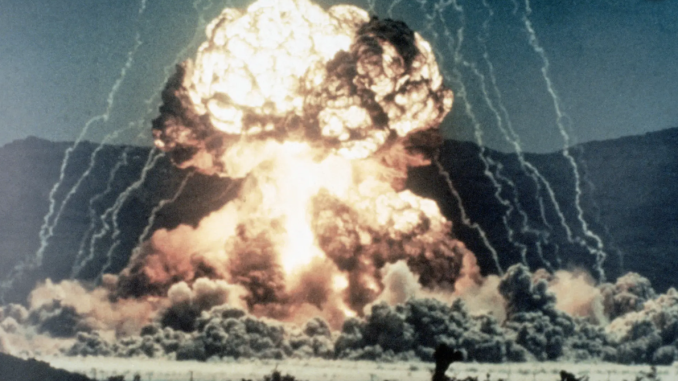
The satire of 1964’s “Dr. Strangelove” may become a terrifying global reality by 2024, a coalition of scientists desperately warn.
Over 100 medical journals are simultaneously sounding the alarm that the potential for world-ending nuclear conflict is “great and growing” amidst states like Russia dangerously stockpiling their doomsday payloads.
“A large-scale nuclear war between the US and Russia could kill 200 million people or more in the near term and potentially cause a global ‘nuclear winter’ that could kill 5–6 billion people, threatening the survival of humanity,” they wrote in unison.
{snip}
The red alert follows January’s frightening moving up of the Doomsday Clock — now 90 seconds to midnight — in what the Bulletin of the Atomic Scientists called “the closest to global catastrophe it has ever been.”
This time last year, United Nations Secretary General António Guterres also said we are in “a time of nuclear danger not seen since the height of the Cold War.”
{snip}
The journals also stressed that the intervention of medical science during the 1980s — under the leadership of the 1985 Nobel Peace Prize-winning International Physicians for the Prevention of Nuclear War — “helped to end the cold war arms race by educating policymakers and the public on both sides of the Iron Curtain about the medical consequences of nuclear war.”
“The danger is great and growing. The nuclear-armed states must eliminate their nuclear arsenals before they eliminate us.”
The current crisis at hand most stems from Russia’s ongoing invasion and subsequent war with Ukraine, according to the Bulletin.
“Worst of all, Russia’s thinly veiled threats to use nuclear weapons remind the world that escalation of the conflict — by accident, intention, or miscalculation — is a terrible risk,” the organization warned in January.
But recently, these threats are becoming much more concrete.
{snip}
Former Russian President and Vladimir Putin placeholder Dmitry Medvedev, now the deputy head of Russia’s Security Council, recently said “the apocalypse isn’t just possible but quite likely,” according to the Associated Press.
The pointed comments come as Russia has moved short-range nuclear weapons into Ukraine’s neighboring nation Belarus. NATO has yet to confirm the validity of the maneuver.
“We must take up this challenge again as an urgent priority, working with renewed energy to reduce the risks of nuclear war and to eliminate nuclear weapons,” the medical journals wrote.
* Article From: The New York Post